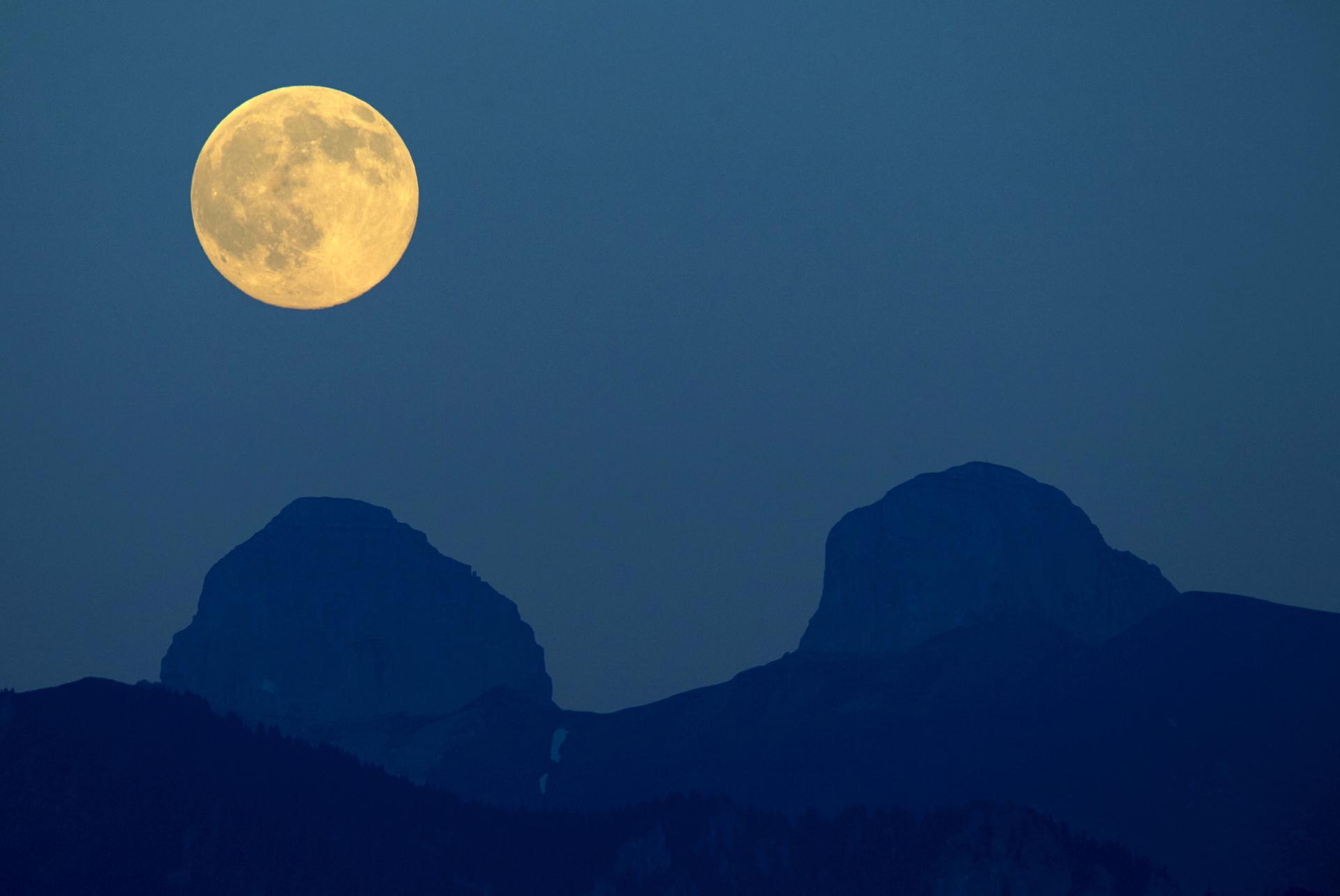The full moon rises above the Tour de Mayen and Tour d'Ai in the Swiss Alps in this picture taken from Chardonne near Vevey, Switzerland,d'Ai in the Swiss Alps in this picture taken from Chardonne near Vevey, Switzerland, July 1, 2015.
I don’t know why, but when my daughter was born I started singing to her in French, a language I learned as a child on sabbatical in Switzerland, and later mostly forgot, from lack of use.
I was 10 when we left our house in a Boston suburb and moved to a village outside Geneva in the middle of winter. Everything was different. School started while it was still dark out. The dark felt darker than the dark at home. The solemn head teacher rang a hand-pulled bell that clanged out over the town, summoning us to the schoolhouse. My brother and sister and I learned to change into slippers in the foyer, take dictation in a language we didn’t know yet, stand up when adults entered the classroom. Recess came as a relief. Our new friends shared their bread and chocolate with us, and taught us Swiss versions of Tag and Hide-and-Seek.
Learning French was a blur. Like watching a movie where everyone’s mouths were moving but no sound came out, because all the sounds were meaningless. Until shards of meaning pierced through. A few at first, and then more and more, until we knew things without knowing we knew them. Like the word that sounded like “bumwa” in one of the games we learned. “Un, deux, trois, bumwa.” And so we named the tree at home where we played after school “the bumwa tree.” How strange when the expression morphed into “un, deux, trois pour moi” (one, two, three for me) a few months later, as words began to come clearer and we could put letters to sounds. We giggled about our burgeoning French. Can you believe we thought it was “bumwa?” Dissolving into laughter, and then more so because our parents still couldn’t tell the difference between “bumwa” and “pour moi.”
The distinct sensations of that year still stick out in my mind. The memories take up disproportionate space in relation to the rest of my childhood. I still know some of the songs I learned there, including one we sang at the school Christmas concert about finding “un monde meilleur,” “a better world,” set to the melody of Dvorak’s New World Symphony.
When my daughter was born it was one of the songs I reached for in the darkness when she’d had her fill of milk but wasn’t asleep yet. I pulled the long-sunken lyrics from the reaches of my mind, strand by strand, like a cartoon bird pulling a worm from the earth, until I was pretty sure I had them right. Then I sang them to her, night after night.
As she grew older she would ask on and off about the meaning of the song. I would translate, clunkily, how it was about civil rights and creating a better world and wondering who has the strength to find that world, sing that world, offer their heart to that world. And then she’d be content and drift away again on the strains of my imperfectly-sung and long-ago French. We called it “French Song” for a long time, in that way that nicknames meant for babies stick even when we’ve all outgrown them. And later we called it “Qui de nous” for the first few words in the song: “Qui de nous trouvera un monde meilleur?” (Which of us will find a better world?)
My daughter is 13 now. We still sing the song. Just the other day she asks, “What does ‘qui de nous’ mean again?”
“It means ‘who of us,’ or ‘which of us,’” I tell her.
“How is it spelled?” she asks.
“Q-u-i d-e n-o-u-s,” I spell.
“How funny,” she says. “I always thought it was K-i-d-i-n-o-o.”
“K-i-d-i-n-o-o?! Really? You did?”
We laugh. It’s funny, nonsensical. And yet I feel a flicker of sadness. How can she think of it as “Kidinoo?” It’s “Qui de nous.” She hasn’t understood the meaning all this time. It’s as if someone has played a joke on us. We weren’t hearing or seeing or imagining the same thing, all those nights of singing softly into the pillow. But how could we have been? She doesn’t know how to speak French, let alone spell it.
It was as if I’d forgotten the most important lesson I learned that year in Switzerland. That the whole world isn’t like a Boston suburb. That what’s inside my head is not the same as what’s inside someone else’s head. My daughter and I see the world from different vantage points. We always have. We always will.
Also from Jeb Sharp: Iran, arms control and a lesson from my mother
Every day, reporters and producers at The World are hard at work bringing you human-centered news from across the globe. But we can’t do it without you. We need your support to ensure we can continue this work for another year.
Make a gift today, and you’ll help us unlock a matching gift of $67,000!
